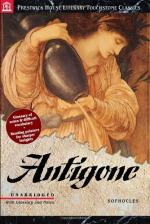|
|
Antigone Objects/Places
Thebes: A city located northwest of Athens. Once ruled by Oedipus, his sons Polyneices and Eteocles staged a bloody battle to win the Theban throne. Both men die in battle and Creon is left as the sole king. Eteocles' body is given proper burial on Theban soil, yet Creon decrees that Polyneices must rot and be eaten by dogs because he is a traitor. Later, Teiresias prophesizes that other cities in Greece will attack Thebes, because Creon has denied burial for men from these cities as well.
Colonus: Location of Oedipus' death. A place in the Greek city-state of Athens, it is a quiet suburb of the main city. Antigone and Ismene return to Thebes after their father's death at Colonus, hoping in vain to stop the war between their brothers.
Body (of Polyneices): A corpse slain in battle outside of Thebes. A topic of great debate, King Creon refuses burial for this body of Polyneices, while Antigone insists that to deny burial violates the gods' laws. After performing burial rites she is sentenced to death; too late, Teiresias warns Creon to bury the body because the gods are, indeed, angry. Even though Creon follows these instructions, he is punished with the deaths of his niece, son, and wife.
Decree (of Creon): An order given by Creon that forbade burial for Polyneices' body upon penalty of death, for his body must rot on the field in front of Thebes. Ismene tells Antigone to obey the decree to avoid a death sentence, but the older sister doesn't listen. Later Teiresias tells Creon that his decree is wrong and has made the gods angry. For his poor decisions, Creon suffers very much with the deaths of his niece, son, and wife.
Zeus: King of all gods. He rules the Heavens. Although Creon is irreverent to Zeus by going so far as to say he didn't care if birds brought torn pieces of Polyneices' flesh directly to Zeus himself, the Chorus remains pious and loyal to this supreme god of all gods.
Danae: Mother of the Greek hero Perseus who experienced much suffering. The Chorus compares her fate to that of Antigone. Like Oedipus' father Laius, Perseus' grandfather received a prophesy from Delphi that his son would one day kill him, and he tried unsuccessfully to kill Perseus to avoid this fate. After living in exile for many years, Perseus returns home with Danae and accidentally kills his father with a discus, thus fulfilling the earlier prophesy, much as Oedipus would do by killing Laius.
Phineus: An ancient prophet whose wife blinded his two sons; he is punished by a jealous Zeus, angry that he has been given psychic powers by Apollo. After being tormented for many years by monsters called Harpies, Phineus is saved by the famous Jason and his Argonauts. The Chorus compares Antigone's suffering to that of Phineus.
Fate: An uncontrollable divine force that predetermines future events. Teiresias and the oracle of Apollo at Delphi can see into the future and know what is fated to happen. Fate cannot be changed, and when men such as Laius or Creon try to avoid the fate that is destined for them, they always fail. Fate cannot be changed. Teiresias also declares that Thebes is fated to be attacked by the cities in Argos.
Seven armies: Seven different armies mustered together from Argos by Polyneices in order to attack Thebes. The armies are each led by a chieftain, but after the battle all chieftains are dead except for one, Adrastus, who flees and seeks help in nearby Athens. The dead chieftains are denied burial at Creon's order; only Polyneices is granted burial eventually, and Teiresias predicts that Argos will soon attack Thebes to avenge these deaths.
Bacchus: Greek god of wine and revelry. After an ancient king of Thebes named Pentheus mocked Bacchus, the god punished Pentheus with a painful death. His body is torn apart by his mother and the rest of his family as they are all driven into madness by a vengeful Bacchus. The Chorus compares Antigone's fate to that of Pentheus.
Argos: A plains region south of Thebes on the Peloponnesian Peninsula in lower Greece. Here such cities as Argos, Mycenae, and Corinth are located; Polyneices recruited chieftains and seven armies from Argos. They are all killed on the battlefield in front of Thebes and denied burial, except for one. Teiresias warns Creon that the cities in Argos will soon attack Thebes to get revenge for the deaths of their citizens.




